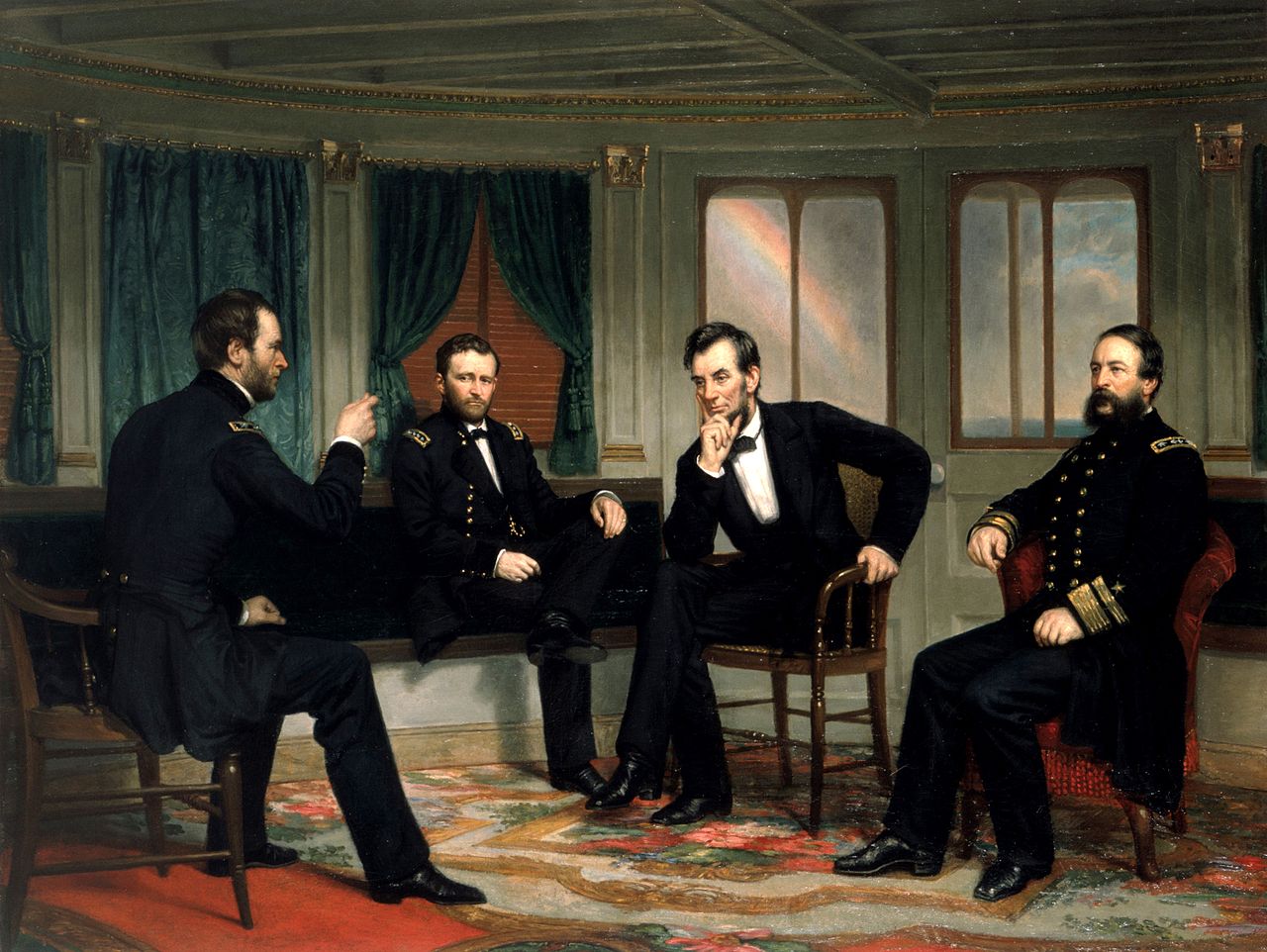Jay, your new book A Nation Forged by Crisis is excellent. It has already been widely reviewed, including in the Wall Street Journal, and it was recently named the best history book of the year by World magazine. More reviews and accolades are sure to follow.
I jotted down some notes as I was reading, but the questions I had were really tangential to the main thrust of your argument that U.S. history from the beginning has been deeply influenced by global events and disruptions in the international system. Your thesis is utterly convincing, and it puts U.S. history in a completely new light.
If you’ll indulge me, I have some questions on some nice small topics ranging from the ideas in the Declaration of Independence to historical inevitability, American exceptionalism, and whether the young United States was pro- or anti-slavery.
Your book opens with the lines from the Declaration that “all Men are created equal and endowed by their Creator with unalienable rights . . . .” But then you go on to say that the first and final paragraphs of the Declaration contained the most critical lines. “Their object was constitutional and diplomatic, not ideological,” you conclude.
Aren’t the first and final paragraphs ideological, too, with references to nature and nature’s God, divine providence, and notions of what the colonies “of right ought to be”? By ideological, do you just mean something like what my father-in-law means when he says “academic,” i.e., lacking in immediate practical value?
How are ideological aims distinguished from constitutional and diplomatic ones? Your framing – and my father-in-law’s pejorative use of the word academic—reminded me of Lincoln’s closing line in an 1859 letter to Henry Pierce: “All honor to Jefferson–to the man who, in the concrete pressure of a struggle for national independence by a single people, had the coolness, forecast, and capacity to introduce into a merely revolutionary document, an abstract truth, applicable to all men and all times, and so to embalm it there, that to-day, and in all coming days, it shall be a rebuke and a stumbling-block to the very harbingers of re-appearing tyranny and oppression.” Was Lincoln right?
Justin Dyer

No denying that I have rather ruthlessly extracted political ideas from the American past. I relegated them to the sidelines in this book because they’ve been out on the field of history, so to speak, for some time. They are tired. And that is not a criticism, for historians have outlined how American history can be seen as a continuous journey from 1776 very well. I can’t tell that story better, so I told a different one.
At the risk of sounding defensive, let me say that I’m not arguing that ideas have no role in America’s development. Rather, I’m seeing what happens to the national narrative when we place at the center of the story not the quest to live up to the promise of 1776 but rather the transnational, material forces of global integration: migration patterns, security threats, and – above all – economic change. When we do this, what stands out are the sudden lurches and changes during past moment of crisis. It is a different story than the one of a continuous struggle for equality that we get from what Lincoln outlines in the Pierce letter. As for the content of that Lincoln letter, I hope he was right that the majority of the world’s inhabitants would come to this conclusion. But the jury is still out.
One more point: you ask how one is to distinguish between ideas and material drivers. Surely they can’t be unraveled. The challenge is to find the right balance. That opening section that seeks to recover the diplomatic dimensions of the Declaration of Independence ends with the point about how the animating ideals of ‘all men are created equal’ have been entwined with the hard world of statecraft and commerce from the beginning. Lincoln’s words do matter in the Civil War era and beyond, absolutely. When I get to the social movements of the 1950s and 60s, I emphasize how economic growth and the formation of a black middle class interfaced with the ideological formation of the ‘American way of life’.
It is such a good and wide-ranging question that I cannot help but to turn it back on you. As someone who has written about natural rights and political ideas, how do you see material drivers – above all the economic forces underlying modern capitalism – fitting into the broad canvas of U.S. history? Are ideas responsive to material trends? Drivers of them? Or are you struck by how they hover above the fray, as it were, following their own dynamic?
Jay Sexton

I wasn’t prepared to answer my own question! Like you, I don’t think ideas and material drivers can be unraveled, and it seems unlikely that the causal arrow always points in one direction or the other. Keying off your last option, I am struck by how the internal logic of some ideas seem to work themselves out over the course of generations, almost as if the ideas live a life of their own. That poses some thorny methodological questions that we will have to sort out over a beer sometime. And thinking of studying ideas . . . You talk at one point about the end of slavery as if it was a direct consequence of the Declaration of Independence. “In the long term, there was no going back from having declared ‘all men are created equal’ in 1776. The genie was out of the bottle.” Knowing you are not a fan of Whiggish narratives of American history, I am curious if you really think there was (and is) no going back. Didn’t we get close to shoving that ideological genie back in its bottle with the Civil War?
Justin Dyer

As you say, there was an alternative. That was the Confederacy, whose cornerstone was slavery. What I was getting at with that line was that the debate over slavery couldn’t magically disappear. But I don’t think that this debate inevitably had to culminate in Civil War. Understanding Civil War causation requires attention to more than just the moral divide over slavery.
This is a tricky issue that I had to deal with in the book, for I found myself torn between wanting to remind my target audience of general readers that slavery was the cause of the war (of course it was!!!), while still outlining how the Union collapsed in a particular geopolitical context. It is no coincidence that the Civil War occurred just after America established national security, indeed founded an immense continental empire. It occurred a few years after the greatest proportionate wave of immigration in American history, as well as at the end of an unprecedented boom in Atlantic trade and investment that had followed on from the transatlantic free trade acts of 1846. I wanted to explore these points, while never losing sight of the slavery debate. I hope I threaded this needle in the book. But I didn’t want there to be any question as to the centrality of slavery and, indeed, the agency of African Americans themselves. This is why I ended that chapter with a discussion of how runaways did more than politicians to bring down the slave empire.
This brings me back to political thought, where I bet there is a case to be made that the Civil War was inevitable once the conflicting interpretations of the nation’s founding started to rub into one another. Viewed from this perspective, was the Civil War inevitable?
Jay Sexton

Fair point. I think we could at least say that political and cultural conflict, if not all out war, was set into motion by these conflicting interpretations of the founding. One side or another had to win a decisive victory through either politics or war. From at least one perspective of that conflict, saving the Union meant saving the “last best hope of earth” – which leads us to the question of American exceptionalism. In the book, you write that the “old shibboleth of American ‘exceptionalism’ – that most persistent of nationalist myths, which posits that the course of US history has been the unique product of its internal formations, institutions, and ideology – has obscured the ways in which the volatile forces of global integration have conditioned its development.”
For me, this was a new way of thinking about American exceptionalism, i.e., as a provincial view that sees national development as uniquely driven by domestic forces disconnected from a broader global context. American exceptionalism is a contested concept, I know, but I am more familiar with other uses that are less about the causes of national development (whether primarily internal or external) than the uniqueness of the American project. The Great Seal of the United States declares two exceptional things: that the U.S. is a novus ordo seclorum, a new order for the ages, and annuit coeptis, that God has favored our undertakings. Tocqueville thought we were exceptionally democratic, Lincoln thought we were (or at least he urged us to be) exceptionally committed to the ideals of the Declaration of Independence, Marxists thought we were exceptionally resistant to Communism, and twentieth-century social scientists thought we were exceptionally religious and exceptionally fond of firearms. Conservatives, of course, tend to think these exceptions make us better than other countries, especially our more progressive European counterparts, while liberals often wish we had just a little more of the secularism, socialism, and cosmopolitanism of Europe. Viewed from either direction, though, there is an element of exceptionalism, whether we think America is exceptionally good or bad.
Two follow up questions, then. Just as a descriptive matter, does our history and culture make us unique in the ways Tocqueville and Lincoln and others have thought? Normatively, as a historian, are you comfortable saying some countries are better and some worse than others?
Justin Dyer

I’m certainly a fan of America, the Midwest in particular. But my view on exceptionalism derives not from being American, but rather from teaching all those years in England when I had to deal with British students proclaiming the exceptionalism of their nation. ‘Rubbish!’ I would say, ‘America is the exceptional one!’
This is what nations do: they create narratives to reinforce the various boundaries that hold themselves together; they find and emphasize what sets them apart; they airbrush out of their past those things that are incongruous with their internal mythology. Some do this for mostly good purposes; others do it for malevolent reasons – I have no problem saying that whatsoever. To return to America, let me say this: not a day goes by when I don’t count our blessings that America and its allies won the Cold War.
The United States is different from other nations, absolutely, but that is not to say that it exceptionally departs from some broader norm of historical development. In the book I write about national variations on international themes. The critical moments under the microscope are all periods of broader reconfiguration: the rebellions in the age of Revolutions, of which the American Revolution was but one; the wars of national consolidation in the mid-nineteenth century, one of the bloodiest of which was the U.S. Civil War; and the steroidal growth of national power during the 1930s and 40s, which produced outcomes ranging from fascism to communism, with the New Deal being the moderate American variation. The baggage of exceptionalism weighs down the historian who seeks to understand the underlying forces that shifted during these periods of reconfiguration, changing all nations, not just the United States.
Having said all that, there is a secondary case for American exceptionalism to which I’m not opposed. The moment in which that idea took root was the mid-twentieth century, at the height of the nationalism of the early Cold War. Americans clearly thought they were exceptional. And they were right in an underappreciated way: they lived in a peculiar moment of the nation’s history. The heyday of exceptionalism occurred during a period of the nation’s history that stands further apart from the historic norm with the passage of time. The biggest difference can be found in America’s position in the world: the world’s greatest debtor in the 19th century (and today) was briefly an exporter of capital; the black hole that sucked up labor from around the world (in the 19th century and again today) dramatically limited immigration in the 1920-70 period; the nation notorious for its isolationist politics and unilateralist diplomacy took the lead in constructing new international institutions of governance, security, and finance. The list could go on, including the ephemeral power of organized labor in the mid-twentieth century that Jefferson Cowie has written about in a book that I highly recommend, The Great Exception: The New Deal and the Limits of American Politics.
So maybe American exceptionalism isn’t a completely dead idea – maybe it refers to an exceptional (and ephemeral) moment in the nation’s past, the era of the Second World War and ensuing Cold War.
Jay Sexton

Okay, final question. In a couple of places, you refer to the young United States as a “proslavery republic.” I agree with you that slavery was a great evil and a great contradiction at the heart of the American founding, but I don’t see the United States after the revolution as proslavery. Rather, it seems like the revolution highlighted a deep tension between principles and practice but also nudged the country in a more antislavery direction than it would have taken had the revolution never happened. In his famous book on the Dred Scott decision, the late Stanford historian Don Fehrenbacher observed that the “antislavery tendencies of the revolutionary period were not inconsiderable. State after state took steps to end the African slave trade. Abolition of slavery itself was achieved in New England and Pennsylvania, and it seemed only a matter of time in New York and New Jersey. Virginia gave strong encouragement to private manumissions by removing earlier restrictions upon them, and both Maryland and Delaware subsequently followed her example. By the 1790’s, abolition societies had appeared in every state from Virginia northward, with prominent men like Benjamin Franklin and John Jay in leading roles. And Congress in 1787 prohibited slavery in the Northwest Territory with scarcely a dissenting vote.” Of course, Fahrenbacher later wrote a book titled The Slaveholding Republic. Was his early assessment of the “not inconsiderable” antislavery tendencies of the revolution too sanguine?
I have more questions, but they will have to wait. Thanks, Jay, for playing, and congratulations again on a fine work of scholarship.
Justin Dyer

I love reading Fehrenbacher, one of the great writers of all time. And he knew his stuff, as well. I think he gets this issue pretty much right in his last book on the slaveholding republic: the Founding Fathers were of two minds, both as a collective and even some as individuals. Furthermore, the slavery question was probably not as central to their statecraft as we would like to think. The result of this ambivalence and disregard was a Constitution that at once enabled anti-slavery forces (as you point out) while simultaneously empowering the embryonic slave power. The new republic raced off in two directions at once. There is a similar dissonance in the territorial ordinances of the period, with slavery prohibited in some places and encouraged to thrive in others. In short, the Founding generation kicked the can down the road. And, it is worth pointing out that Britain ended slavery in its Caribbean possessions some thirty years before American emancipation, though it is anyone’s guess what would have unfolded had the thirteen colonies not attained their independence.
That is Fehrenbacher’s (and my) general view of the founding documents of 1787. But when one steps back and surveys the broader story, surely the trend line of the period 1790-1860 is that of the expansion of slavery – geographically, economically, and politically. The cotton kingdom was a remarkable construction, a powerful product of an early wave of globalization. The Old South was the creation of a booming transatlantic economic complex, one that integrated into the global commercial system of the British Empire. Southern separatism was linked to its integration into the British-led global economy. The textile industries of Lancashire shaped the growth of American slavery as much as did American politicians and legislation. Fehrenbacher, I hasten to add, was aware of this. But he didn’t have the benefit of the rich scholarship that has come out in the last ten years or so that I have.
My answer to your question is, I hope, not a dodge: the Constitution set the terms of the debate and absolutely sowed the seeds of anti-slavery, but it was the global economy that drove the conversation forward. Those Southerners who came to see slavery as a ‘positive good’ by the 1830s were responding to the needs of a newly powerful – yet vulnerable – socio-economic regime.
It’s been my pleasure. I’m looking forward to the next conversation!
Jay Sexton



